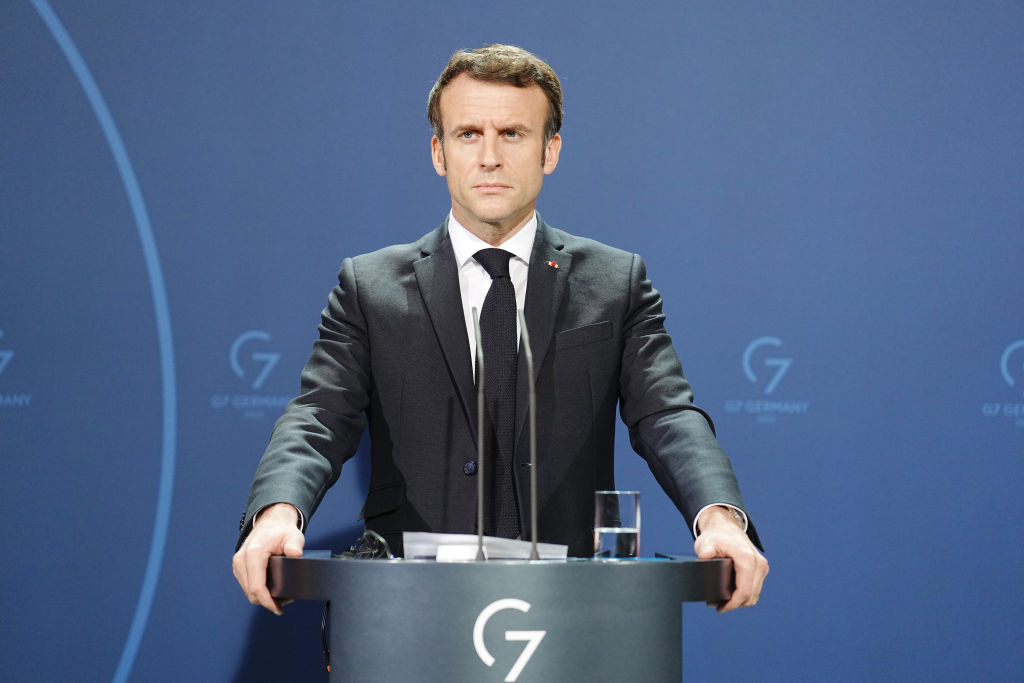Landing in Moscow on February 7, French President Emmanuel Macron had a twinkle in his eye and a spring in his step. There he was, taking it upon himself to be the first European head-of-state to meet Russian President Vladimir Putin since over 130,000 Russian troops massed on Ukraine’s border from three sides.
Macron’s mission was to explore whether a de-escalation with Russia was possible. “I believe that our continent is today in an eminently critical situation, which requires us all to be extremely responsible,” he told reporters before his five-hour session with Putin began. The other option, what could be the largest land war in Europe since World War II, would be far worse.
In a world of logic and reason, doing everything possible to stave off a war the US intelligence community estimates could result in tens of thousands of casualties and millions of refugees would be an endeavor worth supporting. Macron, however, started getting flak the moment he announced his diplomatic initiative to Moscow.
Macron’s talk about coming up with “a new order of security and stability” in Europe raised eyebrows from Carl Bildt, the former Swedish prime minister. Some experts on Europe, meanwhile, warned that Macron’s trip to Russia won’t help and could even “cause more damage.” Reporters were also skeptical that Macron’s meet-up with Putin would produce anything: who is Macron, they ask, to decide these questions for all of Europe?
But the French president isn’t freelancing. Sure, Macron may have a high opinion of himself and believe he is the only one with the talent to talk Putin into seeing the situation clearly (if his public remarks are any indication, Putin is at least interested in some of what Macron had to say). But to categorize Macron’s trip to Russia, and his follow-up trip to Ukraine the next day, as some kind of ego trip that shattered transatlantic unity is absurd.
Macron spoke with British Prime Minister Boris Johnson on Saturday and President Joe Biden the following day — and you can bet your bottom dollar that Macron’s upcoming trip to the Kremlin was the main topic of conversation. Germany, Europe’s largest economy and one of its most influential members, has been in the loop as well (German Chancellor Olaf Scholz met with Biden at the White House yesterday, where the two went out of their way to assure everyone in the room that Washington and Berlin were putting up a united front against Russia). Macron has also spoken with Putin numerous times, with a January 31 phone conversation a likely preview of what the two men intend to discuss today.
The most ridiculous proposition, though, is the idea that the leader of one of Europe’s biggest powers shouldn’t be a main participant in resolving one of the most significant European security crises of the post-Cold War era. President Biden can have video summits with Putin, but apparently the French president can’t do the same. Only the US, the leader of the free world, can submit draft proposals to the Russian Foreign Ministry; the Europeans are meant to follow Washington’s diktats, like obedient children following their parents around the grocery store.
Except this isn’t the way that international relations is or should be. Europe is a power in its own right, with a formidable $15 trillion economy, a deep bench of experienced diplomats at its disposal, and a collective military capability that is more competent than traditionally assumed. Europe, in other words, has agency — and if a potential armed conflict on the continent itself isn’t enough to put that agency to good use, then what is?
Macron has spent a good deal of his five-year tenure trying to educate his fellow Europeans about power, a concept that continues to serve as the engine of nation-state behavior. In remarks last December, Macron spoke about the European Union’s imperative to evolve from a “Europe of internal cooperation to a powerful Europe active in the world, fully sovereign, free in its choices and master of its own destiny.”
Coincidently, what Macron is talking about here is in keeping with what successive American administrations have claimed to want: a strong, sovereign Europe that can pull its own weight, able and willing to be proactive on matters of European security instead of involuntarily asking the US for assistance. Indeed, if there is one commonality between Barack Obama, Donald Trump, and Joe Biden, it’s support for the idea of European self-reliance.
Unfortunately, words are only words. American policy in Europe is still very much in keeping with the conventional status quo. We scold and guilt-trip the Europeans to step up to the plate, but remain nervous about what a real, sovereign, independent Europe would mean. It’s the policy equivalent of telling your significant other to change his eating habits, only to yell at him for munching on carrots instead of potato chips.
Last week, Europe looked like the deflated adult sitting at the kids table. Now, one of Europe’s leaders, Macron, is seeking a leadership role in the Ukraine crisis. We should be encouraging the trend, not poking holes in it.


















